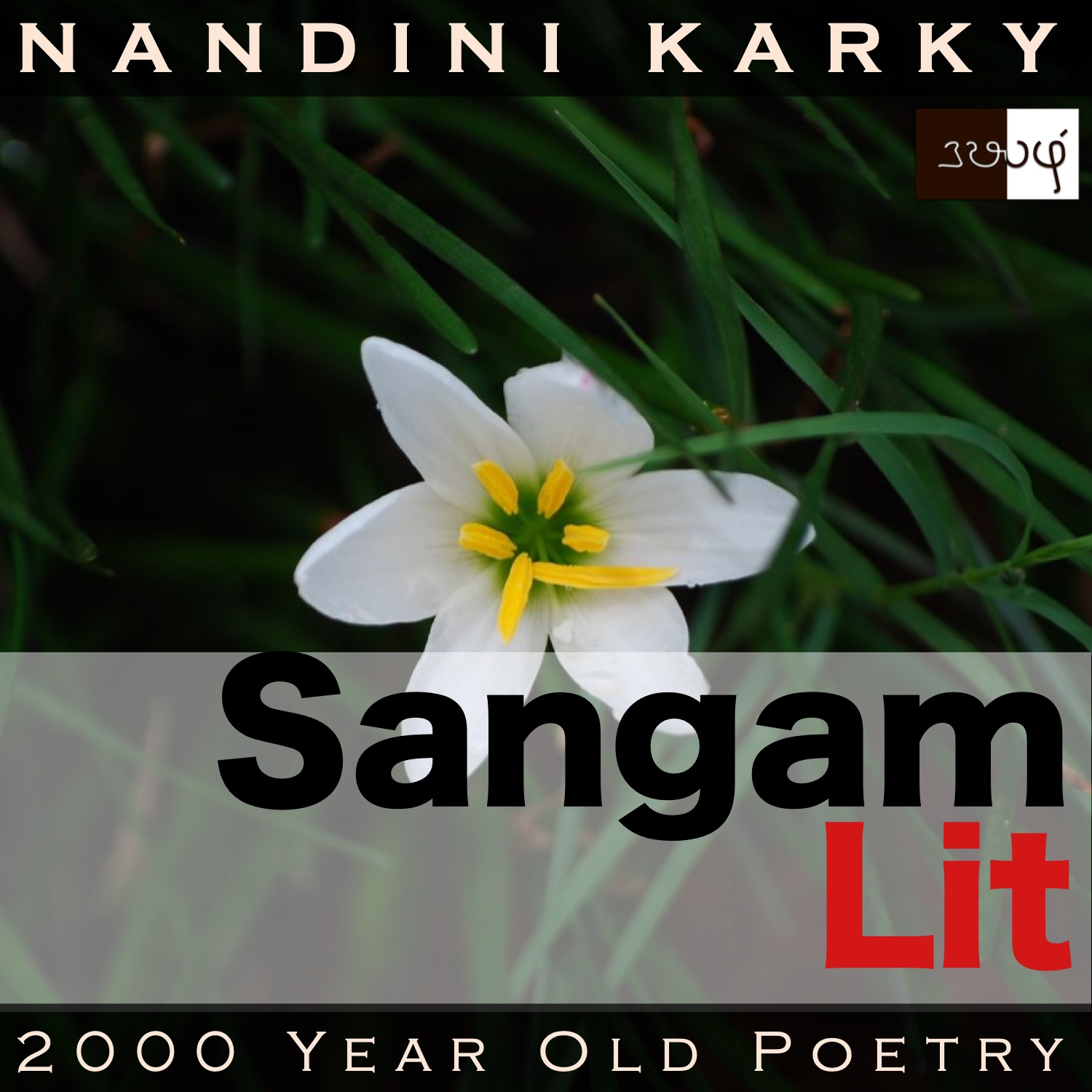Podcast: Play in new window | Download
Subscribe: Apple Podcasts | Spotify | Amazon Music | Android | iHeartRadio | Email | TuneIn | RSS | More

In this episode, we perceive intricate knowledge about seasons and plant life, as depicted in Sangam Literary work, Kurunthogai 282, penned by Naagam Bothanaar. Set in the drylands of ‘Paalai’, the verse speaks in the voice of the confidante to the lady, assuring her that the man would return soon.
செவ்வி கொள் வரகின் செஞ் சுவற் கலித்த
கவ்வை நாற்றின் கார் இருள் ஓர் இலை
நவ்வி நாள்மறி கவ்விக் கடன் கழிக்கும்
கார் எதிர் தண் புனம் காணின், கைவளை,
நீர் திகழ் சிலம்பின் ஓராங்கு விரிந்த
வெண் கூதாளத்து அம் தூம்பு புது மலர்
ஆர் கழல்பு உகுவ போல,
சோர்குவஅல்ல என்பர்கொல்-நமரே?
‘How can he not think of you?’ is the central question here! The opening words ‘செவ்வி கொள் வரகு’ meaning ‘the proso millet just in the right stage’ talks about a crop ready for harvest. In ‘கார் இருள் ஓர் இலை’ meaning ‘a leaf in the colour of darkness’, we get a hint about the perception of colour in the ancients and how they seem to have seen dark green as black. The phrase ‘நவ்வி நாள்மறி’ meaning ‘a deer’s fawn’ bring fauna into the picture. Time of the year makes itself evident in ‘கார் எதிர் தண் புனம்’ meaning ‘moist fields in the rainy season’. A flower comes to the fore in ‘வெண் கூதாளத்து அம் தூம்பு புது மலர்’ meaning ‘a new white nightshade flower with a beautiful stigma’. Ending with the words ‘சோர்குவஅல்ல என்பர்கொல் நமரே’ meaning ‘will your man consider that those will not fall off?’, the verse invites us to know more.
What could millet crops and nightshade flowers have to do with the man’s parting? The context reveals that the man and lady were leading a happy, married life when the man parted away to gather wealth. Before he leaves, the man promises the lady that he would return by a particular season. Observing the promised season of return approaching, the confidante says to the languishing lady, “Stalks of mature ‘varugu’ millet, flourishing on red soil highlands, rustle aloud in the wind. A single leaf in the hue of midnight darkness on this stalk is fed upon by a deer’s fawn, so as to satisfy its hunger for the day in the season of rains. When he sees such moist fields that have tasted the rains, will he think of bunches of white nightshade flowers in water-rich mountains that bloom together, considering the time when those new flowers with picturesque long tubes fall away from the stalks, and decide, unlike that, your bangles will not slip away?” With these words, confidante conveys to the lady that it would be impossible for the man not to be reminded of his promise to return when he observes the changes around him.
A deep confidence in how another would think, that looks like! Let’s delve into the confidante’s words to extract the nuances. She first talks about a millet crop that’s rustling in the breeze and informs us how this crop is in the just right stage of ripeness. Then, she goes on to talk about how a deer fawn is snatching and feasting on a single leaf on this crop as its food for the day. Then, the confidante says such scenes unfold in the season of rains and the man is sure to glance at the same in his journey. When he does that, is it possible that he would think that unlike white nightshade flowers that bloom and fall off their stalks, your bangles will not slip away, the confidante puts forth a question to her friend.
Consolation concealed in that question! The confidante seems to strongly believe that when the man sees signs of rains in the scenes before him, he would undoubtedly remember his promise to the lady to return by the rainy season. Now, the highlight of this verse is how well-versed this poet seems to be about the relation between seasons and the changes in crops and flowers. How many of us can say with conviction when exactly the different food crops we consume are in the right stage of harvest, sitting at our computers, delving into abstract dimensions of our own professions? Why is some knowledge so important at some periods of human life and then it fades away? And likewise, what knowledge that is being taught and instilled into young minds today is going to become similarly irrelevant a few decades later? A verse that feeds not just the young deer but our own minds with a rich staple of food for thought!




Share your thoughts...